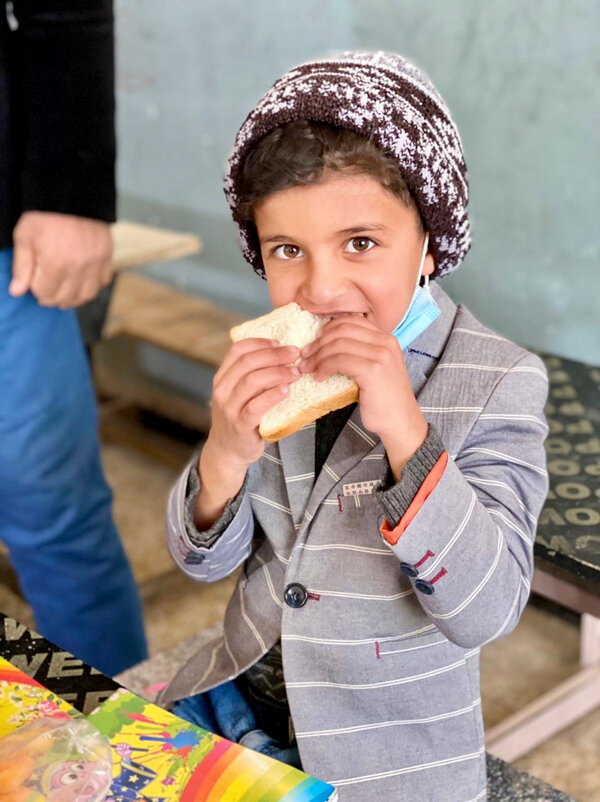The Iraqi Ministry of Education and WFP plan to broaden access to school feeding for 3.6 million children

“The Ministry of Education is a longstanding champion of school nutrition, which is a pillar to help children stay in learning. It is proven that the school feeding programme is vital for achieving success in education, strengthening children’s focus and mental capacity. Last year, the schools where we ran the National School Feeding Programme had improved rates of 99 percent retention, and 97 percent attendance of students,” said Iraqi Director of Sport and Deputy Education Minister spokesperson Mohammed Al Aboudi.
At a two-day, consultative workshop last week, the partners, including the Ministry of Planning, Ministry of Trade and Ministry of Health, worked on a strategy to expand the school feeding programme based on its success in improving learning opportunities.
The school meal includes a bottle of water, freshly baked bread, cheese and a piece of fruit. This balanced meal provides the energy that school children need to focus during classes. In addition, all the food is purchased from local suppliers, bakeries, fruit markets and small businesses. This strengthens the capacity of small business owners, facilitates the creation of hundreds of livelihood opportunities in areas where the programme is implemented, and invigorates national and local food systems.
In the new 2021-2022 academic year, the partners’ aim is to support 450,000 children, then 900,000 children the following year, subsequently 1.8 million, and 3.6 million by 2024-2025. The plan is also to hand over the joint programme to the government.
The high-level workshop provided the opportunity for MoE, WFP and partner ministries to discuss priorities such as focusing on the most vulnerable children, and the selection of food items for the school meals. A national school meals committee – chaired by Ministers – will also be formed, to help place children’s futures at the centre of the national agenda. A new National School Feeding Policy is also being jointly developed.
“WFP appreciates the continuous investment of the Ministry of Education in the School Feeding programme in past school years, in recognition of the importance of health and nutrition for school children in Iraq,” says Abdirahman Meygag, WFP Representative in Iraq. “WFP is committed to supporting the Ministry of Education to create a strong school feeding policy and to expand the programme, so more children have the chance to learn better, leading to improved chances to fulfil their potential as adults.”
The partners also committed to advocate for the creation of a national pooled fund for school feeding, to help with long-term finance needed for the programme. To ensure a successful handover, WFP will also continue to support the Ministry of Education with training and development on key systems and staff skills, alongside local Directorates of Education. Such capacity strengthening can enhance the long-term success of the School Feeding Programme, and ultimately the futures of millions of school children.
# # #
The United Nations World Food Programme is the 2020 Nobel Peace Prize Laureate. We are the world’s largest humanitarian organization, saving lives in emergencies and using food assistance to build a pathway to peace, stability and prosperity for people recovering from conflict, disasters and the impact of climate change.
Follow us on Twitter @WFP_Iraq @wfp_mena @wfpgovts
Topics
Iraq School meals Food securityContact
Sharon Rapose, WFP Erbil,
+964 780 915 0962,
sharon.rapose@wfp.org
